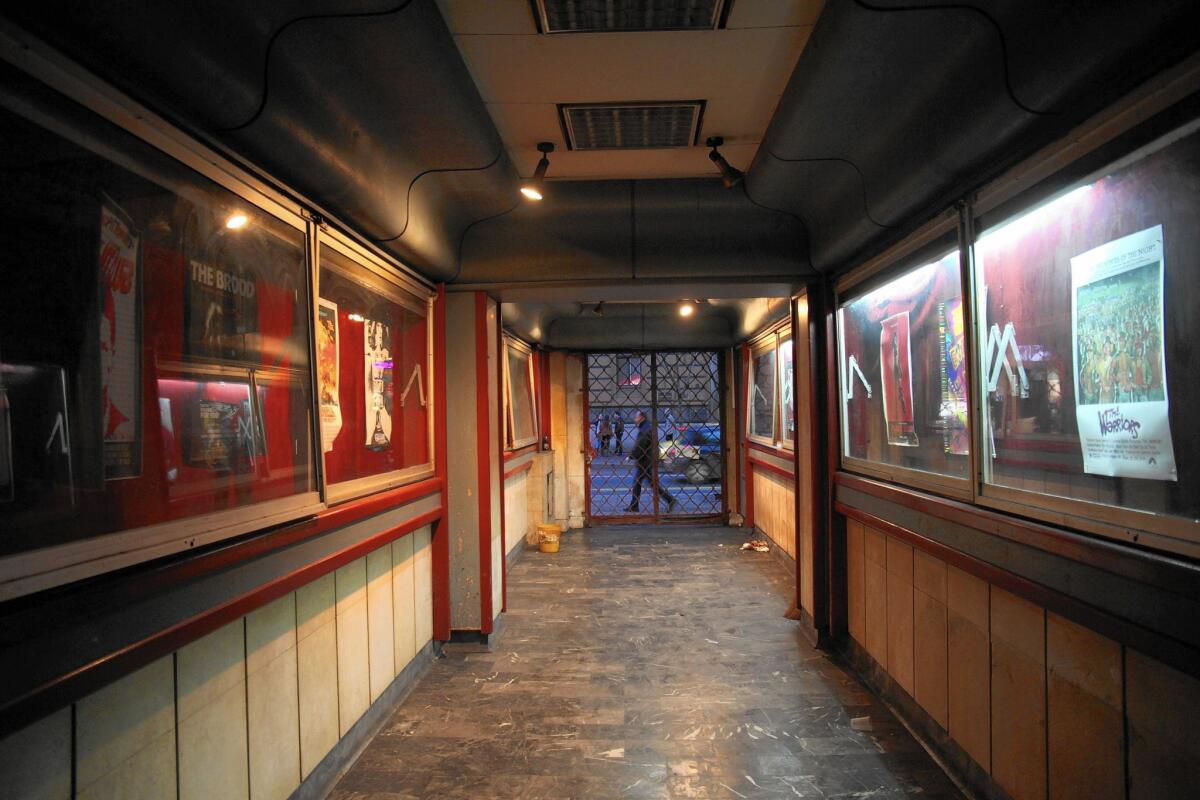Film buffs stage a sit-in, 15 months and counting, to save a Belgrade cinema

Reporting from BELGRADE, Serbia — In a run-down Belgrade theater, young film buffs smoke cheap cigarettes beneath posters of iconic Hollywood and Yugoslav films and lament what they say is the plundering of Serbia’s cultural heritage.
“Here, the politicians lack the subtlety to even pretend to care,” says Vladimir Gvojic, a 25-year-old actor and part of a movement bringing movies back to derelict Belgrade theaters. “All these cinemas are just real estate now.”
For the last 15 months, Gvojic and a small group of film enthusiasts have occupied Belgrade’s Zvezda, or Star, Cinema. Established in 1911, with an Art Nouveau front and plush red seats, it is the city’s oldest theater — and a point of pride recalling the glory days of Yugoslav cinema.
The young protesters are angered at the Serbian government’s corruption-mired privatization schemes of the last decade, which saw the state-owned Beograd Film — replete with 14 revered cinemas, including the Star — dismantled and its theaters sold off at rock-bottom prices.
All have since closed their doors and fallen into disrepair; some were converted by foreign investors into sandwich bars and gambling dens.
“As a kid I came here and watched movies,” says Luka Bursac, 26, one of the theater’s lead occupants and a student from Belgrade University’s school of dramatic arts.
He recalls directing an erotic 2013 documentary titled “Threesome” and struggling to find a place to screen his film.
“There was this old porn cinema called the Partizan just around the corner, playing porn and kung fu movies,” says Bursac, sitting in the Star’s second-story makeshift office. “I wanted to get inside and premiere my documentary. But it was like some security guys inside ... told us that the cinema wasn’t open anymore and threw us out.
“So I started wondering: What happened to all these old cinemas? Why are they closed?”
In 2007, a London-based Serbian derivatives trader, Nikola Djivanovic, bought Beograd Film for a reported $10 million, about half its value. He quickly sold his stake to a private equity firm, Lantern International.
“He is a criminal who defiled the culture of our country,” says Gvojic, holding out his smartphone, which depicts the businessman with a scrawl reading “I Saw the Devil” — an ultra-violent 2010 South Korean horror film — superimposed over him.
Fed up at the ransacking of Serbia’s arts and armed with crowbars, walkie-talkies and flashlights, a small group of still-unknown film enthusiasts broke into the Star on Nov. 21, 2014, apparently scaling a tree behind it before crawling through a ventilation shaft into the building. They broke the lock that had kept the ruined theater’s doors closed to the public for nearly a decade.
About 200 demonstrators, including workers rights activists and film connoisseurs, flooded the cinema, beginning a sit-in known as the Movement for the Occupation of Cinemas.
Its logo depicts a clenched fist stretched skyward, clutching a length of film.
Despite numerous obstacles, the young film enthusiasts have turned the dilapidated relic into a showcase once more, screening as many as three films a day and more than 500 over the last 15 months.
They slept under thick duvets, vowing to spare the Star from other cinemas’ fate, and went to work: repairing an old Slovenian Iskra 35-millimeter projector that was left in the projection booth, sweeping the floors and repairing a leaking roof. A new projector was hauled in too, bought with donation money. A 150-seat, open-air amphitheater behind the building, a feature added in the 1970s, was given a paint job and used to screen movies in the summer.
“Obviously what we are doing is illegal,” says Gvojic, his round glasses telegraphing the hit man in Luc Besson’s “The Professional.” “But that’s the point: Everything that has happened to this cinema is illegal.”
Bursac wrote letters to Serbia’s 20 wealthiest people, seeking help to cover the costs of running heaters during the frosty months.
“None of them replied,” Bursac says, his breath coming as mist in the winter chill; they can no longer afford the cost of heating the cinema. “No surprises there.”
The movement has won the support of French director Michel Gondry and Greek Prime Minister Alexis Tsipras, who spoke at the theater during a visit to Belgrade. Gondry directed an animated short in support of the movement, which is screened before each film.
About 10,000 people have passed through the cinema over the last year, issued vintage pink entrance receipts — from the once-again staffed ticket booth — and popcorn for about $1.
They had a chance to see film flickering to life on the Star’s screens: Serbian director Aleksandar Petrovic’s 1967 classic “I Even Met Happy Gypsies.” “Rosemary’s Baby” by Roman Polanski. “Africa Addio,” which documents the collapse of colonial-era Africa. Terrence Malick’s masterpiece “The New World.”
“All the films we screened are carefully selected and have internal cinematic value,” Gvojic says.
At one point, the movement’s leaders even arranged a Skype conversation with Djivanovic, which they projected on the main cinema’s screen, before a packed hall.
Djivanovic spent 18 months in jail awaiting trial for abuse of power — a trumped-up charge, he insists — after acting as an advisor to Belgrade on financial legislation and debt restructuring in the mid-2000s.
He was released after agreeing to pay a $3-million fine. He claims his detention was unlawful and failed to meet European Union standards.
To call him unrepentant would be an understatement. He defended his business decisions in an interview, saying his goal was “to make money. And I did.”
He said he saw no logic in maintaining “a valuable asset as a loss-making enterprise.” And, he added, “I must admit that I have no concern whatsoever for the cultural scene of Belgrade. Why should I?”
Djivanovic expressed scorn for the film buffs occupying the derelict Star. “I feel great pity for them,” he said. “Imagine being an artist in Serbia. You might as well commit suicide immediately.”
A tour of the Star reveals massive neglect. Masking tape holds cracked windows together; shattered glass covers the floors. Tendril cracks run down walls threatening to crumble and cave. Grimy bric-a-brac spills from rooms. The darkened walk to the projector room reeks of cat feces.
The state of Belgrade’s theaters reflects a broader decay of cultural icons in the former Yugoslavia, which broke up amid the collapse of communism in Eastern Europe in the 1990s.
The Museum of Contemporary Art in Belgrade, an impressive building on the banks of the Sava River, has not hosted an exhibition in a decade. A much-anticipated overhaul of the National Museum remains in limbo; the museum’s doors have been locked for years.
However, probably the most painful blow came in April. Avala Film, founded at the end of World War II by the former Yugoslav leader Josip Broz Tito, was sold for $9 million.
The once-stately hilltop studio — with assets running well into the tens of millions of dollars — had fallen into neglect and was auctioned to a company called Filmway. That company was reportedly registered one month before the sale, with total capital of about $550.
The sale included about 215,000 square feet of studio space, costumes, props and the rights to the entire Avala Film archive, about 600 films, reports indicate.
Many of those films were prestige wars epics or famed pictures from the so-called Black Wave epoch, a defining period in which experimental Yugoslav directors launched stinging critiques of the socialist state.
“This is our country’s cultural capital,” says Andreja Pavlovic, another of the young demonstrators and a political science major. “It is the equivalent of losing ‘Citizen Kane.’”
Film posters adorn the cinema’s walls: the somber 1967 Yugoslav melodrama “The Rats Woke Up”; David Cronenberg’s “The Brood”; assorted Quentin Tarantino movies.
“We’d like to see this become a film studio, where young people could come and express themselves through film. But that requires a lot of financial support and repairs to the building,” Gvojic says. “I think we can get the ownership, if some crazy guy came and gave us money.”
Yet 15 months of occupation has taken its toll. The movement has fractured, with an ardent core of about a dozen occupiers enduring the winter chill. Break-ins, an attack by right-wing extremists — fended off with crowbars — and a major flood of the premises have sapped their energy.
“We are really trying to decide what to do next,” Bursac says. “It’s very possible we will be thrown out in the end.”
Johnson is a special correspondent.
ALSO
Obama says he plans to stay in Washington after presidency
GOP elites have a new strategy to stop Donald Trump, but it carries a big risk
Oscar Pistorius denied chance to appeal and now faces sentencing for murder conviction
More to Read
Sign up for Essential California
The most important California stories and recommendations in your inbox every morning.
You may occasionally receive promotional content from the Los Angeles Times.










